Upcoming Events
FORTHCOMING
Past Events
FALL 2025 CONFERENCE
Artificial Influence and the Engineering of Mass Persuasion
Missouri S&T Center for STS | KI Center for AI & Autonomous Systems | Miner AI
Please join us November 6th & 7th, 2025, at the Havener Center - Carver/Turner Room
Keynote speaker: Dr. S. Scott Graham, University of Texas
"Science that Sells: How Methods can Drive Promotional Language Use in Research on Health AI"

66th Midwest Junto for the History of Science
Missouri S&T Center for Science, Technology, and Society
Please join us March 22, 2025, at the Innovation Lab, Forum
Registration:
Conference Schedule: Junto Conference Schedule
The 66th annual meeting of the Midwest Junto for the History of Science will be held 21-22 March 2025 at Missouri S&T.
The 2025 Junto will be co-sponsored by the Center for Science, Technology, and Society at Missouri S&T.
For more than six decades, the Midwest Junto has fostered an informal, congenial environment where students, faculty, independent scholars, and other research professionals can gather to discuss their research. We will have fifteen-minute presentations on many aspects of the history of science, technology, or medicine, as well as related STS fields. Graduate students from Midwestern history of science and STS programs are particularly welcome to participate.
Please register for the Conference:
If you have any questions, please contact the Director of the CSTS, Dr. Kathleen Sheppard (sheppardka@mst.edu).
Artificial Intelligence and You: The Social and Human Dimensions of AI
Missouri S&T Center for Science, Technology, and Society
April 25-26, 2024
Innovation Lab - Forum Room
650 Tim Bradley Way
Rolla, Missouri
The Missouri S&T Center for Science, Technology and Society invites proposals for paper presentations, poster sessions, and panel discussions for the Spring 2024 conference, Artificial Intelligence and You: The Social and Human Dimensions of AI.
With the rise of the use of generative AI in most facets of human life, scholars, practitioners, and the general public should pause frequently to ask questions about the technologies that humans are rapidly allowing to have more and more agency over our daily lives.
What is AI? What does it mean to be artificial? How is intelligence created? What are the advantages and disadvantages when data gathered by artificial intelligence impacts human decision-making in areas such as healthcare, personal security, or consumerism? What do you do when your smart device tells you to breathe or move or sleep and what does this suggest about the future of human agency?
Please Register Here: https://mst.qualtrics.com/jfe/form/SV_1B2yrf2W15jkrSR
Final Program: AI and You Program
Keynote Speaker Dr. Joy Lisi Rankin:Rankin Bio and Abstract
CSTS will live stream the events here: https://umsystem.zoom.us/j/93732637748
(There will be no online participation or recording of these events)
If you have any questions, please contact the Director of the CSTS, Dr. Kathleen Sheppard (sheppardka@mst.edu).
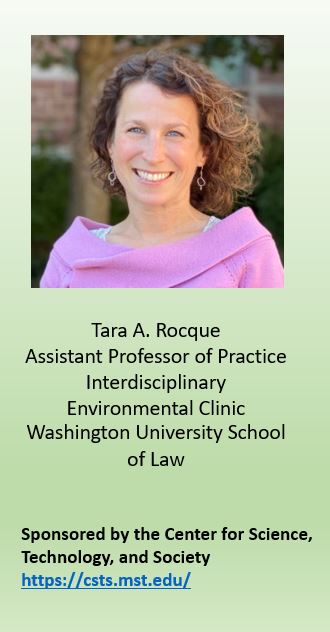
Environmental Racism in St. Louis
September 26 12 pm
https://umsystem.zoom.us/j/4757708789
This talk will address the various ways in which environmentalism, racism, and disinvestment collide, disparately impacting Black St. Louisans and causing significant harm to health, safety, and financial stability.
Tara A. Rocque is an Assistant Professor of Practice and Assistant Director of the Interdisciplinary Environmental Clinic, focusing on issues of environmental justice, water protection, and the effects of coal-fired power plants. She joined the law school after over 10 years of litigation experience, including work on efforts to hold a mining and smelting organization responsible for lead poisoning caused by its operations.
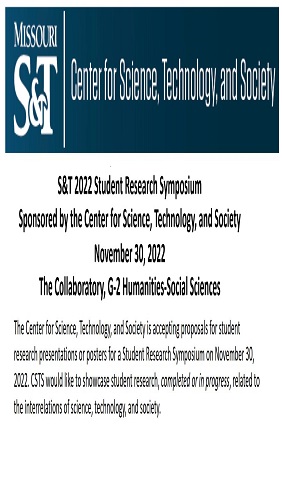
S&T 2022 Student Research Symposium
Sponsored by the Center for Science, Technology, and Society
November 30, 2022
The Collaboratory, G-2 Humanities-Social Sciences
The Center for Science, Technology, and Society is accepting proposals for student
research presentations or posters for a Student Research Symposium on November 30,
2022. CSTS would like to showcase student research, completed or in progress, related to
the interrelations of science, technology, and society.
We invite research from all disciplines—scientific, technological, philosophical, historical,
rhetorical, artistic, or any combination. Of particular interest this year are topics that
address the question of “technology and good living.” We hear a lot about smart living
and innovation. But how might or how has technology help/ed society to move toward
the “good”?
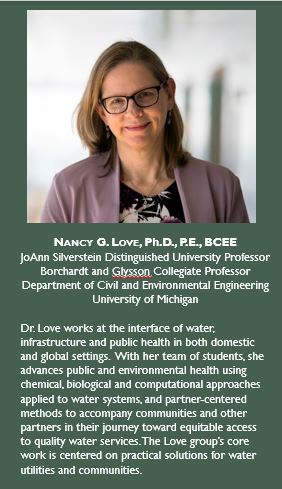
Reflections on Engineering: Scholarship in Service to Society
May 5, 2022- 1 pm
https://umsystem.zoom.us/j/4757708789
Historically, engineering curricula and the research enterprise have remained highly focused and “inside the fence” of academic labs or under very controlled research settings in the field. But increasingly, we see are seeing rapid growth and interest in community-engaged research, learning, and outreach by engineering academics. Community-engaged work can occur in various forms: research in partnership with communities, service-learning oriented courses, and professional outreach through civic organizations or professional associations
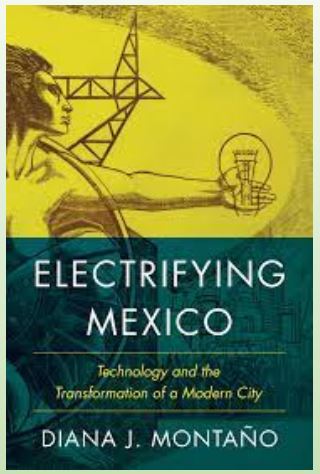
Policing Electricity: Power Theft and Everyday Life in Mexico City, 1901-1918
November 10, 2021 2 pm
https://umsystem.zoom.us/j/4757708789
Diana J. Montaño's research interests include the construction of modern Latin American societies with a focus on technology and its relationship to nationalism, everyday life and domesticity. Her first book Electrifying Mexico: Technology and the Transformation of a Modern City examines how ordinary citizens used electricity, both symbolically and physically, in the construction of a modern nation. The book weaves together how these "electrifying agents" first crafted a discourse for an electrified future and secondly, how they shaped its consumption. It shows how these agents of modernity promoted and created both imaginary and tangible notions of this technology. Taking a user-based perspective, this study reconstructs how electricity was lived, consumed, rejected, and shaped in everyday life.
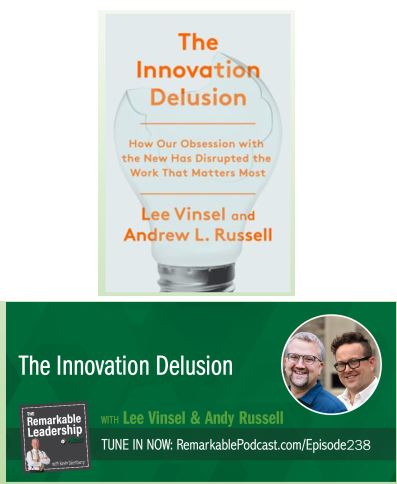
The Innovation Delusion: How Our Obsessions with the New Has Disrupted the Work thatMatters Most
December 2, 2021 1 pm
https://umsystem.zoom.us/j/4757708789
Since the 1950s, we have literally heard the word "innovation" more and more every year. But is this innovation-speak getting us what we want? In this talk, I will examine the history of innovation-speak, argue that it isn't getting us more innovation and comes with serious costs, including distracting us from important issues like maintenance and repair. I will outline some of the ideas of The Maintainers community, which has been thinking about these topics for the past six years. The Maintainers is a global, interdisciplinary research network focused on maintenance, repair, and the mundane work that keeps our world going.
CSTS Symposium
September 24, 2021
The Futures of STS in Engineering and Polytechnic Universities
What does the future of STS look like in engineering and polytechnic universities? In such STEM-focused environments, where STS scholars often operate independently and without a central STS department or program, how can STS researchers maximize their impact on the education of undergraduate and graduate students, as well as on the original research conducted by (and often financially supported by) colleagues in engineering departments? How can STS researchers become indispensable to engineering and scientific research endeavors without being perceived as simply support personnel? Assembling convergent research teams to tackle important social and scientific challenges is an acknowledged best practice, so how should STS researchers embrace convergent research endeavors in order to add value and lead inquiries into areas of new and developing knowledge?
Please register for each panel individually by clicking on the registration links in the Symposium Program below.
*ALL TIMES IN CENTRAL US
